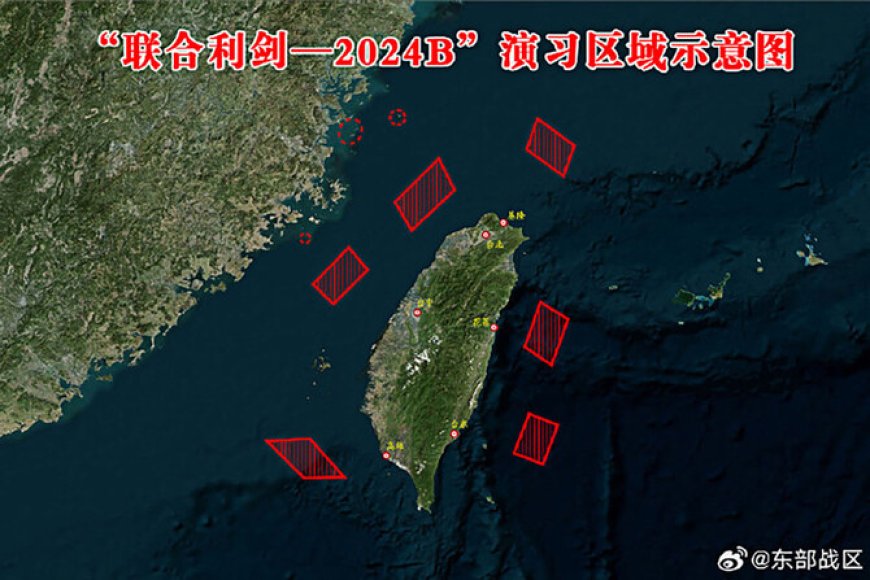China increases military pressure on Taiwan by means of open-endered war games
In what Beijing has called a "stern warning," China has increased military activity close to Taiwan and started a fresh set of war simulations around the island without a specified end date. Dubbed "Joint Sword-2024B," the military drills signal the new phase in a protracted stalemate between China and the democratically run island Beijing regards as its own territory.

In what Beijing has called a "stern warning," China has increased military activity close to Taiwan and started a fresh set of war simulations around the island without a specified end date. Dubbed "Joint Sword-2024B," the military drills signal the new phase in a protracted stalemate between China and the democratically run island Beijing regards as its own territory.
Confirming the drills were occurring in several important areas surrounding Taiwan, including the Taiwan Strait and areas to the island's north, south, and east, the Eastern Theatre Command of the Chinese military According to an official release, the drills comprise combat-readiness patrols by air and sea as well as operations aiming at blockading important ports, attacking marine and ground targets, and ensuring "comprehensive superiority." China has not declared live-fire drills or no-fly zones, but the extent and magnitude of the actions point to a major military buildup.
Rapidly denouncing the drills, Taiwan's authorities said they were a "blatant provocation" endangering regional peace and stability. In a statement, the Mainland Affairs Council of Taiwan, which supervises the island's China policy, attacked Beijing's denial of renouncing the use of force and underlined its commitment to self-defense. Emphasizing its readiness to guard the island, Taiwan's defense ministry stated it had sent its own forces in reaction to the war drills.
These military drills coincide with the national day speech given by Taiwanese President Lai Ching-te, who said that China has no right to represent Taiwan, therefore aggravating already existing tensions. Beijing swiftly denounced Lai's comments and used them as reason for starting the present round of war games since it sees any claim of Taiwan's independence as a challenge to its sovereignty. With the People's Liberation Army (PLA) warning that those "who play with fire get burned," Chinese official media have been constantly spewing reports criticizing the speech.
President Lai underlined in his national day speech Taiwan's will to preserve peace and stability as well as her collaboration with China on world issues including climate change. Beijing has always rejected any interaction that does not acknowledge Taiwan's claim over the island, notwithstanding his friendly tone, discounting of any overtures for communication.
Using these drills to indicate its readiness for a possible military confrontation, the PLA has produced videos featuring its troops "prepared for battle." Speaking anonymously to Reuters, a senior Taiwan security official said that China might be practicing a blockade of Taiwanese ports and international shipping routes, therefore testing tactics to repel foreign forces that would enter the case of a real battle.
With official media showing China's coast guard setting law enforcement patrols close to Taiwan's coasts, Chinese military have also allegedly engaged activities near the outlying islands of the country. A Chinese aircraft carrier group was also seen south of Taiwan negotiating the key Bashi Channel, an important waterway connecting the South China Sea to the Pacific.
These military moves have more than just saber-rattling stakes. Since the United States has increased its diplomatic and military interaction with Taipei, China has progressively used its military strength to show discontent and push Taiwan. Especially in 2022, China fired missiles over Taiwan in a show of might after U.S. House Speaker Nancy Pelosi visited the island.
China's "Joint Sword" war games have been a regular occurrence; a past round in May 2024 similarly positioned as a punitive reaction to what Beijing judged threatening remarks from President Lai. Beijing's military pressure is getting more intense, hence Taiwan finds itself in a difficult situation trying to balance its need for peace with its necessity for self-defense.
Rejecting Beijing's assertions of sovereignty, Taiwan has been steadfast in its belief that only its people will decide the island's future despite China's military posture. International watchers are growing worried as cross-strait tensions get more severe that China's military operations combined with its belligerent language could cause a dangerous miscalculation resulting in a possible confrontation with far-reaching effects for the area.













































